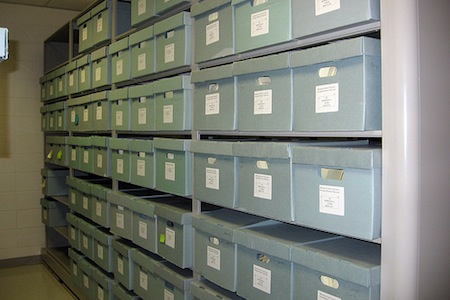Georgia State Archives Closure Sparks Outcry, Backtracking

Credit: Flickr/dolescum.
In a move that has left many Georgia residents stunned, Secretary of State Brian Kemp has announced that the State Archives will be closing their doors to the public as of November 1. The reason is financial: over $730,000 is to be cut from next year’s state budget. In an official statement last Thursday, Kemp admitted that current Archives staff would be reduced, and that public access to the building would be restricted to appointment only. Kemp is anxious to emphasize that this was a decision of last resort. “While Archives does provide a great service to the citizens of Georgia,” he explained in an email, “the department only generates a fraction of the revenue that it costs to operate. We simply do not have the money to keep it open to the public.”
Georgia historians and genealogists are not taking the closing of the archives quietly. The announcement has prompted an outpouring of protest from amateurs and professionals alike, including an online petition that reached nearly 14,000 signatures in under a week and a Facebook page called “Georgians Against the Closing of the State Archive,” which has over 3,000 likes. The outcry earned a front page story in the Atlanta Journal-Constitution on Monday, where historian James Cobb, a distinguished professor at the University of Georgia, published a piece that minced no words. He calls the decision a “death sentence” for historical research in the state, and points out that “none of our less affluent southern neighbors, who are facing the same economic woes plaguing us, has even come close to shutting down its state archives.”
His sentiments are echoed by many. “I know this is a budget issue,” said Patricia Powers, an amateur genealogist who uses the Archives to research family history, “but I believe my tax dollars are supporting many bloated programs.”
“If all the other states in our country can keep their archive [sic] open to the public why is GA so ill equipped to do the same?” wondered Rene Hardin, a member of the Daughters of the American Revolution. She and other members used to research at the Archives several days a week, but due to the increasingly restricted hours of operations they have been forced to limit their trips to only once a week.
Reductions to staff and hours have been going on for at least the last two years, but never gained much public notice until the announcement last week. It seems the value of the Archives is being recognized belatedly by many, but frequent visitors like Hardin are quick to point out that the loss will affect far more than historians and genealogists.
“Closing this important resource to the public… will have long-lasting negative consequences for our state,” said Jennifer Dickey, who works as a preservationist at Berry College and teaches public history at Kennesaw State University. She calls the Archives the “keepers of our collective memory,” and adds that they contain information for all citizens. She is right: the Archives are home to a wide range of records and information, from reports and agreements on state and county boundaries, to official copies of state laws, to records from all state agencies and local governments. Much of this information cannot be found anywhere else in the state.
“In effect,” said Hardin, “one of the original 13 colonies will be cut off from research.”
The prospect is an alarming one. “History is not just for historians,” insisted Professor James Roark of Emory University, whose students often use the Archives for research. “Without our history we risk amnesia -- we can’t ask old questions, and we can’t ask new questions. History is the source of who we are.”
Such sentiments are echoed in the comments of those who have signed the online petition and joined the Facebook page. Many are lifelong residents of Georgia who fear the loss of connection with their own family history -- both for themselves, and for their children. “This is a big deal,” said Powers, who hopes that perhaps a membership program could be instated to help bring in some revenue, and says that she will be writing and calling state legislators to suggest it. Others have promised to do the same, and in his op-ed piece Cobb urges readers to contact Governor Nathan Deal. Kemp himself has called for action, asking concerned citizens to contact state law makers and ask them to restore funding to the Archives.
As it turns out, these efforts may already be working: on Wednesday over 80 petitioners met with Governor Deal as he signed a proclamation declaring October as Archives Month across the state. The governor assured them that he would keep the Archives open. “We’re working on our budget proposals, and we’re going to make sure [they] stay open,” he promised.
The news has brought encouragement to supporters of the Archives, though most say that they will continue to spread the word. And so they should: despite Deal’s promise, state legislators will not take up the issue until at least January, and the $730,000 that Deal’s office wants cut from the budget will have to come from somewhere. Additionally, seven of the remaining ten Archives employees have already been given notice that they will lose their jobs on November 1. Closure remains a very real possibility.
Roark believes that the rest of the nation should take note, for the sake of their own history. “This is not a Georgia problem,” he warned. “This is a national problem.”
